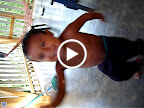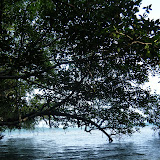How is the latrine project going? It could be worse. It could be better. The hardest part is trying to secure funding.
I put about six months into trying to work with government agencies for . They are the Panama equivalents to our Department of Health, or EAP. These agencies are theoretically responsible for managing and/or funding projects country-wide. I say theoretically because due to a variety of reasons, in my experience at least, many tend to be unable or unwilling to do it. Despite all of the obstacles, I still thought working with local authorities was a more ¨sustainable¨option. My committee could develop the project with personel they could have lasting relationships with, and learn more about how to interact with formal governement agencies (I wrote a little about this before
here.), which many are intimidated to do . At the outset anyway, it looked like we would have less trouble finding support, because I would be there as a liason for the duraction of the project.
The other choice for project funding is what is called a PCPP-- Peace Corps Partnership Program. Volunteers essentailly write a grant proposal, which is posted on the Peace Corps Web site, and rely on organizations, individuals, and other interested parties to fund the project. I was initially hesistant about using this option because I felt that the funding for a project with a resonable budget should come from within Panama. My community members cannot replicate the PCPP process after I leave, and I run the risk of having them view this project as something I did
for them or brought
to them, rather than something they acheived for themselves. To me, that is worse than not building any latrines at all. The upside of the PCPP is that it does allow us more control in the actual planning and managing of the project, which is a huge learning opportunity for me and my community members, and almost makes up for the funding aspects.
Up until last week, we were still trying to work with the agencies. About a month ago, I presented my latrine committee with the option of a PCPP, and they still chose to try the agency approach. On Friday, when the Ministry of Health (the most recent of the agencies we´ve tried to work with) s tood us up for a charla they insisted they give, we reached the end of the line. This came after months of cancelled meetings, ignored phone calls, and a complete lack of direction. My committee was unwilling to continue that way, and I was too. Most of our time was spent waiting, and we had little to show for the months we´d invested. There was no guarantee they would ever be able to fund the project anyway. So with a little prodding from me, they chose to go ahead with the PCPP, where the funding is a more sure thing. Furthermore, about half of participating families want composting latrines, which are more costly and harder to get agencies to support (This will be an explanation for another post).
So I have one more charla to do with them about the use and maintenence of latrines, then I will work the committees to teach them how to make a budget, work plans, and other necessary pre-planning. Then I will submit this with the rest of the PCPP and try to do as much fundraising as I can from here. It should take a few months to raise all the money, and then we can begin contruction.
People outside of the Peace Corps bubble sometimes struggle to understand this process. Why it takes a year to get this far. For better or for worse, that is what grassroots development is. I walked into a community that didn´t know what Peace Corps was, thought I was either a) rich or b) a bad guy, and had a heck of a lot to learn about latrines and project planning. Before even talking about projects, I had to gain their trust first, get to know them, and identify their real needs. After we decided on a latrine project, we established a committee, and I began the slow process of trying to start a project with them.
Other development agencies might have written the community a check or delivered the materials, without deciding who should participate, and whether the people knew how to use or maintain latrines. Ten years ago, the Minsitry of Health did something similar to this, and recipients used all the materials for latrines to build chicken coops. People in my community are used to going to the bathroom in the woods, or the creek, and the latrine use presents a lot of issues. They are not for everyone. Not yet, anyway.
It takes time to determine real interest, provide trainings about disease transmission, use and maintencnce, and see who is still interested at the end . Projects that hand things out and don´t do the groundwork first fail, especially in rural areas like mine. I don´t want this project to fail. So while it has been slow, I think it will be more successful in the end, and in the meantime, I have stayed busy enough with other side projects and work in other communities. But I look forward to actually getting this project off the ground when we start building. My counterpart organized our first work day to start digging latrine holes this Saturday to keep motivation and focus. And you know, that whole
if you dig it, it will come thing.
What do people do for work?
Most people in my community
are subsistence farmers and do not have other jobs. Their chief income is from their cocoa farms. Harvest time is October through early January, and that is when they make their largest profits (up to a few hundred dollars a month for someone with a well-maintained well-producing farm). As for where they get the rest of their money, I am still not sure. Some families sell oranges, lemons, or root vegetables for some extra income. Others also collect welfare checks each month, and use the scholarship money the government awards to students to make ends meet. The people are poor, but they are genearlly able to meet their basic needs. This complacency, combined with a lack of education and capital makes upward movement uncommon.
What are education levels?
People over 30 in my community mostly made it to sixth grade, some stopped earlier. Back then, there was no highway through the community, and to continue past sixth grade meant taking a boat to a community that had a junior high. This was costly and required that students stay overnight with family that lived where the school was, or madke some other arrangement. Few continued. Today, we have Pre-K through 9th grade in my community, which is more than most Ngobe communities have. Unfortunately, for those that make it to 9th grade, few continue on because that means traveling to another community by bus. This costs 50 cents a day and this cost, combined with uniforms and school supplies, is too high for most familist in my village. Last year, only two boys graduated high school from our community. I do think that education and schools are more valued now than they must have been years ago, but it is still hard to see families keep their kids at home due to a lack of money or hope that the investment is worth it.

















